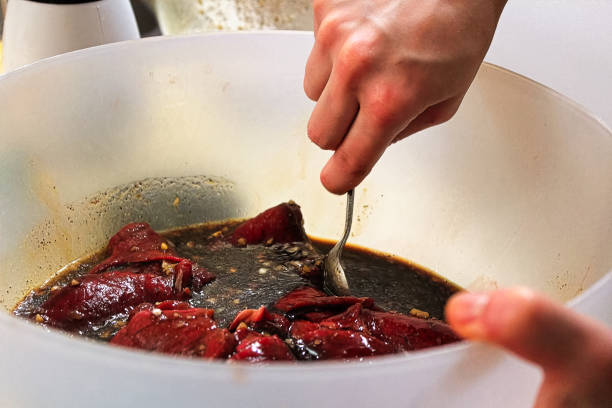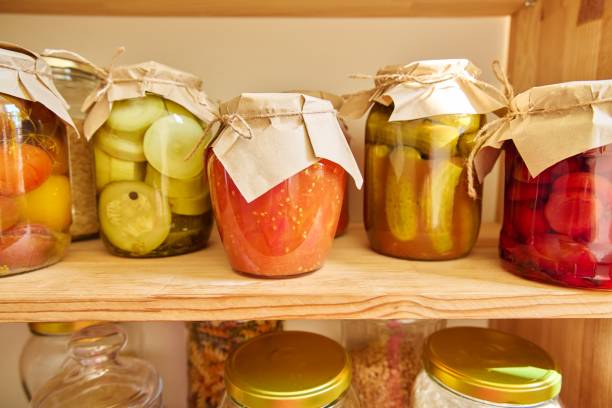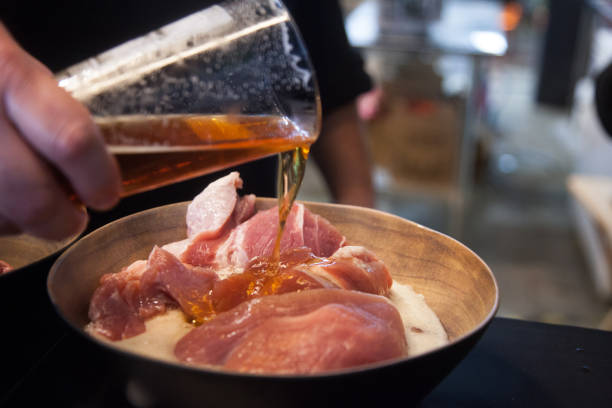An excellent marinade can make or break a grilled meal, but it can be difficult to plan ahead for. Planning for several days to soak fillets can be difficult to handle when you’re trying to whip up a dish on the spur of the moment. Regular proteins like beef, pork, and chicken must sit longer for the taste to be proper. Marinating meats requires specific time to sit on sauces and spices, but how to speed up marinating if you’re in a hurry?
As we go along, we will determine the time it takes for meats to become marinated. Yet, also stated here is the process of how to speed up marinating.
How to Speed Up Marinating: Knowing What is a Marinade
A liquid sauce used to add flavor by pouring it over food is what most people think of when they hear this term. Actually, they can be dry, and from a scientific perspective, they have more capabilities than only improving the flavor of food. In the cooking method known as marination, ingredients are soaked in a seasoned liquid, typically a marinade.

The use of saltwater in preserving may have led to the practice of submerging other meals to add taste or disguise inferior products. The two most common varieties are acidic and enzymatic. Vinegar, wine, and lemon juice are examples of acidic blends, while pineapple, papaya, kiwi, and dairy are examples of enzymatic blends.
The meat’s texture will be softer and more appetizing after being marinated, and you’ll have an easier time chewing and digesting it, too. A dull chicken breast can be transformed into a new and exciting meal by being marinated in teriyaki one night and classic BBQ sauce the next, without breaking the bank. Tough pieces of beef can be rendered completely edible with sufficient time and the correct ingredients soaked in a marinade.
The Benefits of Marinating Meat
The marinade is not just a saucy thing on your meat. It also imparts some advantages.
🥩Flavors
Adapting your marinade to any cuisine is as easy as changing a few ingredients. You can drastically improve the flavor of meats and veggies using just a few simple pantry staples. You can customize this dish by choosing to increase the heat, smoke flavor, or increase the sugar content.
🥩Crispness
Flap steak becomes melt-in-your-mouth tender after being marinated, while grilled chicken breast has all the flavor and moisture you might want. Meats that are naturally leaner, such as chicken or turkey, can be made tender and flavorful by marinating them.
🥩Condensation
Meat that tends to dry up during cooking might benefit greatly from being marinated, which is a process similar to brining. While salt is the key ingredient in brining, a marinade uses acid, oil, flavors, herbs, spices, sweetness, and sodium to soften and flavor the food you cook.
❇ Health Benefits of Marinades
When you make your own marinade, you know exactly what goes into it, unlike when you buy a jar from the store, which could contain unhealthy additives or excess calories. Marinades might help limit the formation of carcinogenic chemicals such as HCAs and PAHs by acting as a buffer for the meal.
How to Speed Up Marinating: the Ingredients
Since marinade imparts flavors and involves a variety of herbs and spices, here are the basic flavor component of a marinade:
🧅Fat
You can’t have a marinade without fat, which helps the meat absorb the marinade’s other flavors and stay wet while the meat cooks. Adding fat to a dish is a great way to balance out the flavors and prevent any one of them from becoming overpowering. Oils like olive and sesame, as well as other condiments like yogurt, buttermilk, tahini, and mayonnaise, are all viable options.

🧅Seasoning
When using a marinade, a pinch of salt will help the marinade get into the meat and keep its flavor after it’s cooked. Meat’s proteins are reorganized by salt, making more room for water to fill in. Relaxing the muscular fibers softens tough meat for easier chewing. Ingredients like miso, pickle juice, kosher salt, soy sauce, and fish sauce are all examples of salty foods.
🧅Alcohol
This marinade’s ingredient weakens meat’s surface proteins and enhances flavor organically. Citrus juice, pickled juice, balsamic vinegar, cider vinegar, spicy sauce, and buttermilk are just some examples of the many components that belong to this category.
🧅Proteases
It aids in the digestion of the meat by reducing the connective tissue on its surface. Papaya, or the protein-digesting enzyme papain, are also viable options.
🧅Condiments
For the sake of brevity, let’s just say flavor. You may also use the dry rub blend as a marinade. You can also add different mustards, curry paste, tamarind pastes, Worcestershire sauce, chili powder, spaghetti seasoning, peppercorns, ginger, chopped garlic, and many other spices.
Types of Food to Marinate
Well, before jumping into knowing how to speed up marinating, it is essential to learn the type of food you are going to marinate. And, here are they:
✔️Seafood
Marinating fish and shellfish for longer than an hour might cause the flesh to “cook” in the acid, resulting in mushy results.
✔️Chicken
Whether you’re cooking the whole bird or just a few bites, a marinade is a great choice. The spatchcocking method of cooking a whole chicken involves flattening the carcass before cooking. Also, a chicken will soak up more marinade if you cut it into small pieces or take the skin off.
Once the skin is removed, marinating is quick and easy. Marinating time ranges from 20 minutes to 3 hours for smaller incisions like breasts and legs. Soaking a whole chicken in water for at least 12 hours is required.
✔️Beef and Pork Cuts
Flap meat, skirt meat, sirloin, round meat, and hanger steak are all excellent candidates for marinating in a steak marinade. Cutting the pig’s loin into cubes also yields fantastic results when cooking pork tenderloin or pork loin. You can marinate these steaks for up to a day. Lengthening is especially helpful for larger parts.
Tougher cuts of beef, such as skirt, flank, and brisket, can greatly benefit from marinating, which can intensify their flavor and make them more tender. We suggest soaking these low-cost cuts for at least a minute and up to 12 hours. Steaks of higher quality, such as ribeye and porterhouse, should be marinated less frequently and cooked more simply and classically. So, how to speed up marinating this kind of meat? We will discuss it further.
✔️Tofu
In contrast to meat, tofu can be marinated in flavor for up to 24 hours.
✔️Veggies
If you plan on grilling soft vegetables, don’t marinate them for more than 10 minutes; otherwise, they will lose too much water and get mushy. Water-rich veggies like tomatoes only need 15 minutes in the marinade.
Guidelines for Marinating Meat
A marinade is an acidic, savory sauce that is used to marinate food before cooking to make it taste better or make it more tender. So, a marinade is used for the same reasons it was used centuries ago.
To tenderize and taste the meat, the standard components of a marinade usually grease herbal products, spices, and an acidity fluid like lime juice, balsamic, or wine. Due to the naturally high-fat content of red meat, oil is not always used in marinades.
To marinate (mair-uh-nait) means to soak it in a marinade. Really, you’re just soaking the meat in flavor like a sponge.
1-Marinade to Meat Ratio
If you leave food in an acidic, alcoholic, or salty liquid for too long, the chemicals in the food will “cook” or “denature.” These marinades are best utilized within 4 hours. If you use lemon or lime juice, you should only use citrus juice marinades for up to two hours. The use of acidic marinades necessitates caution. If left too long, these blends can alter the color and texture of the foods they contain. Examples of foods that can go bad quickly include fish fillets.
2-Refrigerate When Marinating
It’s important to remember that bacteria can quickly proliferate on raw meat if it’s warm, so it’s best to marinate it in the fridge or freezer. There are still certain classic recipes that call for a room-temperature marinade.
Avoid doing what they did. When meat is marinated at room temperature, it goes into the “danger zone,” which is the range of temperatures from 40 to 140 degrees Fahrenheit where germs grow quickly. If you marinate in the fridge when the recipe calls for room temperature, you should simply extend the marinating time.
3-Marinating Containers

When marinating, never use a metal dish or pan since the acidic combination can corrode the metal. Only use a glass or plastic container that can be sealed for marinating. Marinate the meat, turning it over so that all sides may absorb the marinade. The most convenient and clean way to marinate meat is in a trash bag with a lock.
When you marinate meat in a bag that can be resealed, the marinade will get into every part of the meat because the air has been taken out. Because of this, you can use much less marinade while still getting through marinating and maximum penetration on all sides of your meat.
4-Approximate Marinating Times
The amount of time needed to marinate changes with the different kinds, sizes, and cuts of meat. The marinating process does not lengthen the storage life of meats that must be kept in the refrigerator. Avoid wasting your time marinating frozen meat since it won’t work.
How Long To Marinate Food?
It’s possible this is a baited inquiry. As was previously said, an acidic marinade has the potential to toughen up the meat, while an enzymatic marinade has the potential to turn it into mush.
Assuming you have used the right amount of acid or protease relative to the flavors and oils, below is a rule of thumb for how long you should marinate your food before cooking it:
The minimum recommended time for allowing flavors to permeate the food is 30 minutes. Any less time than that, and the flavoring will be superficial rather than permeating the meat.
- Curing times for vegetables can range from a few hours to overnight.
- Seafood, including fish, should be consumed within one hour.
- Roasting a chicken takes at least three and no more than twelve hours.
- Time required to marinate pork: 3-12 hours.
- Three to twenty-four hours for beef.
- In the oven, roast a lamb for three to twenty-four hours.
How to Speed Up Marinating?

Here are several shortcuts that can help you get the most out of the meat marinating time you have:
☀ Thin Slices of Meat
Choose thin slices of beef that may be easily covered with marinade and marinated for an extended period of time.
☀ Piercing the Meat
For the liquid to soak in faster and deeper, pierce the meat with a fork or spear and make shallow slashes across the surface.
☀ Make the Meat Smaller
For better marinade absorption, cut the meat into smaller pieces.
☀ Pre-tenderized the Meat
An increase in salt content might alter the protein structure, releasing a latent taste in the meat. Before adding it to the marinade, tenderize the meat using a meat cleaver or rolling pin. Meat that has been “pre-tenderized” can take in more of the marinade and moisture as a result.
☀ Flavors Penetrating the Meat
After covering the meat with the marinade, place it in a plastic bag with a zip-top and press out as much air as you can. The vacuum you produce aids the penetration of the flavors into the meat.
Frequently Asked Questions:
Q: Can you marinate frozen chicken?
YES! Frozen chicken is more homogeneous in size and shape, making it an ideal marinade ingredient. Simply add your preferred marinade to a tight bag or container, seal it up, and place it in the refrigerator for at least a few hours (or overnight if you have the time). Then prepare it your way! This is a piece of cake.
Q: How do you marinate chicken faster?
To begin, rehydrate the dry marinade mix in some hot water prior to putting it on the chicken if you’re using one. This way how to speed up marinating the chicken will quickly absorb the seasonings and flavors if you do this. Second, before marinating the chicken, cut it up into bite-sized pieces. This will speed up and improve the marinade’s ability to permeate the meat, thus making grilled chicken tender.
Q: Is it okay to marinate overnight?
It’s fine to marinate for a full day. When you marinate meat or poultry for a long time, the flavors get all the way through the protein. Keep your food in an airtight container in the fridge so it doesn’t pick up any off-putting odors or scents from other items. Enjoy!
Wrapping Up
Marinating meat imparts flavor and taste due to the various herbs, spices, and other ingredients that it has. A marinade is also a saucy tool that aids the meat to become tender. There are certain time frames in which specific meat can be marinated. There are methods on how to speed up marinating, which is great to hear! Following such steps and strategies can help you to have delectable meat even if you are in a hurry!
